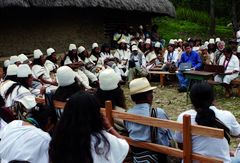
Alirio Uribe, one of the most affected persons at the Lawyers’ Collective, in the Sierra Nevada of Santa Marta, while he gave a workshop to Arhuaco indigenous people. [Photo: Sebastian Rötters]
Article published in the special Newsletter '15 years of PBI', October 2009
Jacobo Blickenov, volunteer from the USA (2008-9)
Colombian government officials abuse their powers affecting the work of human rights defenders; lawyer Alirio Uribe is one of the most persecuted.
On 21 February 2009, Semana magazine revealed that the Department of Administrative Security (DAS) continued to carry out illegal interceptions and surveillance of members of the political opposition, Supreme Court magistrates and senior government officials1. Since then, the wiretapping scandal began. This happened two months after the first reports that human rights NGOs were also victims of interceptions and surveillance by the DAS. Some of the organisations included: the José Alvear Restrepo Lawyers’ Collective (CCAJAR), the Manuel Cepeda Vargas Foundation, the Association for Alternative Social Promotion (MINGA), the Association of Family Members of the Detained and Disappeared (ASFADDES), the Luis Carlos Pérez Lawyers’ Collective (CCACLP), the Inter-Church Justice and Peace Commission (CIJP), the Peace Community of San José de Apartadó, Father Javier Giraldo, the lawyer Jorge Molano, and the journalist Claudia Julieta Duque, all of whom are accompanied by PBI.
CCAJAR was one of the organisations most affected by the so-called «Operation Transmilenio», which was specifically directed against Alirio Uribe, president of CCAJAR at the time2. According to Semana, the DAS reports included some of the most intimate details to his life, even the type of food he liked3. As Alirio Uribe explains, «you get angry because all your private life has been scrutinised, but what most affects you about all of this is that you are not sure what they were looking for. In the end, there may be several objectives, one being psychological warfare or threats, but you can also think that perhaps they wanted to attack some member of the Lawyers’ Collective».
The first institution to carry out these illegal interceptions, the Special Intelligence Group «G-3», was created in 2004 when Jorge Noguera was the director of the DAS. CCAJAR represents the civil party in the cases against Noguera for homicide and conspiracy to commit a crime due to his ties to paramilitaries. The «G-3» group had orders to «destroy or neutralise the activities of civil society organisations»4. Later, there was the so called the National and International Observation and Verification Group (GONI), which had similar tasks and the same coordinator, Fernando Ovalle. The DAS continued to carry out these intelligence activities until at least 2008.
Presently the case is being investigated by the Public Prosecutor’s Office. However, we will probably never know the totality of the information held by the DAS. On 22 February 2009, the day the new director took charge of this agency, videos held by the Public Prosecutor’s Office show DAS agents removing material from the Intelligence and Counterintelligence Offices5. Alirio hopes for «there to be an investigation and for the responsible parties to be punished». In August 2009, Semana reported that «despite being in the midst of the worst scandal in its history, the DAS continues to illegally record magistrates, congress members and presidential candidates» 6.
--
1 «El DAS sigue grabando», Semana Magazine, 21 February 2009
2 «Los del Siempre», Semana Magazine, 25 April 2009
3 «Las fuerzas oscuras», Semana Magazine, 12 June 2009
4 «Colombia: Vigilancia constante del CCAJAR y espionaje en contra del mismo y de otros defensores por parte del DAS», Observatory for the Protection of Human Rights Defenders, 23 June 2009
5 «El espionaje era peor», Semana Magazine, 25 April 2009
6 «Increible... siguen chuzando», Semana Magazine, 29 August 2009
